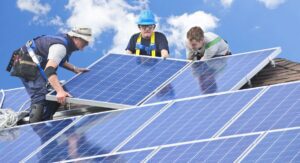
Introduction to Solar Power Systems
Solar energy is becoming a top choice for homeowners, businesses, and governments. As the world moves toward renewable resources, solar power offers a cleaner, more sustainable way to generate electricity. But what exactly are solar power systems, and how do they work?
Understanding How Solar Panels Work
Solar panels, often called photovoltaic (PV) cells, are designed to capture sunlight and convert it into electricity. This process, known as the photovoltaic effect, enables solar panels to transform solar energy into usable electrical power. Here’s a brief look at how this works:
- Absorption of Sunlight: Solar cells absorb photons from sunlight.
- Electron Activation: These photons activate electrons in the cells.
- Electricity Generation: The movement of electrons creates an electric current.
Types of Solar Power Systems
There are three primary types of solar power systems, each with unique benefits and applications. Understanding these options can help consumers make the best choice for their energy needs.
1. Grid-Tied Solar Systems
Grid-tied systems are the most common for residential and commercial use. They connect directly to the local power grid, allowing users to draw electricity when their system doesn’t produce enough power.
- Pros: Lower installation costs and net metering options.
- Cons: Dependence on the grid for nighttime or cloudy days.
2. Off-Grid Solar Systems
Off-grid systems are self-contained, providing electricity independent of the grid. These are often used in remote areas where grid access is limited.
- Pros: Energy independence and backup during outages.
- Cons: Requires battery storage and a larger initial investment.
3. Hybrid Solar Systems
Hybrid systems combine grid-tied and off-grid elements. They include battery storage but are still connected to the grid, offering flexibility and reliability.
- Pros: Backup during grid failures and reduced electricity bills.
- Cons: Higher installation and maintenance costs.
The Benefits of Solar Power Systems
Solar power offers numerous advantages beyond energy savings. Here are some of the top reasons to consider solar energy:
1. Environmental Impact
Solar energy reduces carbon emissions and dependence on fossil fuels, making it one of the cleanest energy sources available.
2. Cost Savings
Though initial setup can be costly, solar panels often pay for themselves over time by lowering electricity bills. With net metering, users can even earn credits on their utility bills.
3. Increased Property Value
Homes with solar power systems often have higher market values. Potential buyers view solar as a long-term investment that cuts future energy costs.
Challenges of Solar Power Systems
While solar power is highly beneficial, there are also challenges to consider.
1. High Initial Costs
Solar installation requires a significant upfront investment, although many financing options are available to ease this burden.
2. Weather Dependency
Solar power generation is less effective on cloudy days and at night, making it essential to consider supplementary energy sources or battery storage.
3. Space Requirements
To capture sunlight efficiently, solar panels require sufficient space, which can pose challenges for properties with limited area. Typically, a larger array of panels will be needed to meet higher energy demands, meaning more roof or ground space is essential. For small properties, this requirement might restrict the number of panels that can be installed, potentially reducing the system’s energy output. Therefore, it’s important to assess available space and determine whether it’s adequate for the desired energy production. For property owners with limited space, alternative solar solutions, such as high-efficiency panels or solar shingles, may help optimize sunlight capture within the constraints of the property
Solar panels need adequate space to capture sunlight effectively, which can be an issue for small properties.
Choosing the Right Solar Power System for Your Needs
Selecting the ideal solar power system depends on several factors, including location, budget, and energy needs. Consulting with a solar professional can help homeowners determine the best fit for their specific circumstances.
Conclusion
Solar power systems are transforming how we generate and use energy. With various options like grid-tied, off-grid, and hybrid systems, there’s a solar solution for almost every need. Going solar not only supports a cleaner environment but also offers long-term financial benefits.
Learn more about how solar energy works from the U.S. Department of Energy

